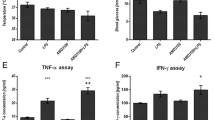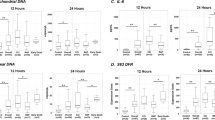Abstract
As the most commonly used drug that can modulate both metabolic and immune pathways, ethanol is evaluated in this report as a regulator of tumor necrosis factor α (TNFα) production in human peripheral blood monocytes (Mφ) in combination with a variety of stimuli. While acute ethanol treatment did not induce TNFα in Mφ, it was a potent down-regulator of Mφ TNFα production whether induced by the combination of interferon-γ plus muramyl dipeptide (MDP) (P<0.001), lipopolysaccharide (LPS) alone (P<0.01), or interferon-γ plus LPS. Down-regulation of Mφ TNFα by ethanol was dose dependent and statistically significant in the biologically relevant, 25–150 mM, ethanol concentration range. We also demonstrate that these ethanol concentrations did not affect Mφ viability. TNFα down-regulation by ethanol was most effective when ethanol was administered 4 hr prior to MDP stimulation; however, it was also effective—though to a lesser extent—if it was added at the time of MDP stimulation. Furthermore, ethanol also down-regulated TNFα production of thein vivo preactivated Mφ of trauma patients, which produce hyperelevated levels of TNFα. We have previously shown that the majority of posttrauma elevated Mφ TNFα is produced by the Mφ subpopulation expressing high-affinity type I Fcγ receptors (FcγRI). When the FcγRI cross-linking-stimulated Mφ subpopulation was treated with acute ethanol, TNFα production was suppressed again both inin vivo preactivated Mφ of trauma patients and in Mφ of normal controls. In experiments utilizing cyclooxygenase inhibitor, we also demonstrate that ethanol has a direct, prostaglandin E2-independent, effect on Mφ TNFα production. These results demonstrate that acute ethanol exposure has the potential to down-regulate Mφ production of TNFα significantly regardless of the TNFα-inducing stimulus. Decreased capacity of Mφ to produce TNFα might, therefore, contribute to the immunological and metabolic abnormalities described after ethanol uptake.
Similar content being viewed by others
References
Tracey KJ: Tumor necrosis factor (cachectin) in the biology of septic shock syndrome. Circ Shock 35:123–128, 1991
Miller-Graziano CL, Szabo G, Kodys K, Griffey K: Aberrations in post-trauma monocyte subpopulation: Role in septic shock syndrome. J Trauma 30:S86-S96, 1990
Eichacker PQ, Hoffman WD, Farese A, Banks SM, Kuo GC, MacVittie TJ, Natanson C: TNF but not IL-1 in dogs causes lethal lung injury and multiple organ dysfunction similar to human sepsis. J Appl Physiol 71:1979–1989, 1991
Thiele DT: Tumor necrosis factor, the acute phase response and the pathogenesis of alcoholic liver disease. Hepatology 9:497–499, 1989
Beutler B, Cerami A: Cachectin: More than a tumor necrosis factor. N Engl J Med 316:379, 1987
Deviere J, Content J, Denys C, Vandenbussche P, Schandene L, Wybran J, Dupont E: High IL-6 serum levels and increased production by leukocytes in alcoholic liver cirrhosis. Correlation with IgA serum levels and lymphokine production. Clin Exp Immunol 77:221–225, 1989
Deviere J, Content J, Denys C, Vandenbussche P, Schandene L, Wybran J, Dupont E: Excessive in vitro bacterial lipopolysaccharide-induced production of monokines in cirrhosis. Hepatology 4:628–634, 1990
Khoruts A, Stahnke L, McClain CJ, Logan G, Allen JI: Circulating tumor necrosis factor, interleukin-1 and interleukin-6 concentrations in chronic alcoholic patients. Hepatology 13:267–276, 1991
Nelson S, Bagby GJ, Bainton G, Warren WR: The effects of acute and chronic alcoholism on tumor necrosis factor and inflammatory response. J Infect Dis 1989:422–429, 1989
Nelson S, Bagby G, Summer WR: Alcohol suppresses lipopolysaccharide-induced tumor necrosis factor activity in serum and lung. Life Sci 44:673–676, 1989
Nelson S, Bagby GJ, Summer WR: Alcohol-induced suppression of tumor necrosis factor-α potential risk factor for secondary infection in the acquired immunodeficiency syndrome. Prog Clin Biol Res Alcohol Immunomod AIDS 325:211–220, 1990
Bermudez LE, Young L: Ethanol augments intracellular survival of Mycobacterium avium complex and impairs macrophage responses to cytokines. J Infect Dis 163:1286–1292, 1991
Nelson S, Bagby G, Andersen J, Nakamura C, Shellito J, Summer W: The effects of ethanol, tumor necrosis factor, and granulocyte colony-stimulating factor on lung antibacterial defenses.In Drugs of Abuse, Immunity, and Immunodeficiency, H Friedman (ed). New York, Plenum Press, 1991, pp 245–253
Zerlauth G, Eibl MM, Mannhalter JW: Induction of antibacterial and anti-listerial activity of human monocytes requires different activation signals. Clin Exp Immunol 85:90–97, 1991
Nacy C, Meierovich AJ, Belosevic M, Green SJ: Tumor necrosis factor alpha—Central regulatory cytokine in the induction of macrophage anti-microbial activities. Pathobiology 59:182–184, 1991
Nilsson E, Lindstrom P, Patarroyo M, Ringertz B, Lerner R, Rincon J, Palmblad J: Ethanol impairs certain aspects of neutrophil adhesion in vitro: Comparisons with inhibition of expression of the CD18 antigen. J Infect Dis 163:591–597, 1991
Jerrels TR, Perritt D, Eckardt MJ, Marietta C: Alterations in interleukin-2 utilization by T-cells from rats treated with ethanol-containing diet. Alcohol Clin Exp Res 14:245–249, 1990
Nedwin GE, Svedersky LP, Bringman TS, M.A. Palladino Palladino J, Goeddel DV: Effect of interleukin-2, interferon-γ, and mitogens on the production of tumor necrosis factors α and β. J Immunol 135:2492, 1985
Gong JH, Sprenger H, Hinder F, Bender A, Schmidt A, Horch S, Nain M, Gemsa D: Influenza A virus infection on macrophages. J Immunol 147:3507–3513, 1991
Beutler B, Tkacenko V, Milsark I, Krochin N, Cerami A: Effect of γ interferon on cachectin expression by mononuclear phagocytes. Reversal of the lps-d (endotoxin resistance) phenotype. J Exp Med 164:1791, 1986
Vermeulen MW, David JR, Remold HG: Differential mRNA responses in human macrophages activated by interferon-γ and muramyl dipeptide. J Immunol 139:7–9, 1987
Szabo G, Miller-Graziano CL, Wu J, Takayama T, Kodys K: Differential tumor necrosis factor production by human monocyte subsets. J Leuk Biol 47:206–216, 1990
Szabo G, Kodys K, Miller-Graziano CL: Elevated monocyte interleukin-6 (IL-6) production in immunosuppressed trauma patients. I. Role of FcγRI cross-linking stimulation. J Clin Immunol 11:326–335, 1991
Kunkel SL, Wiggins RC, Chensue SW, Larrick J: Regulation of macrophage tumor necrosis factor production by prostaglandin E2. Biochem Biophys Res Comm 137:404–410, 1986
Renz H, Gong JH, Schmidt A, Nain M, Gemsa D: Release of tumor necrosis factor-α from macrophages. J Immunol 141:2388–2393, 1988
Beutler B, Krochin N, Milsark W, Luedke C, Cerami A: Control of cachectin (tumor necrosis factor) synthesis: Mechanism of endotoxin resistance. Science 232:977–979, 1986
Takayama TK, Miller C, Szabo G: Elevated tumor necrosis factor α production concomitant to elevated prostaglandin E2 production by trauma patients' monocytes. Arch Surg 125:29–35, 1990
Zembala M, Uracz W, Ruggiero I, Mytar B, Pryjma J: Isolation and functional characteristics of FcR+ and FcR− human monocyte subsets. J Immunol 133:1293–1299, 1984
Jacob CO, Fronek Z, Lewis GD, Koo M, Hansen JA, McDevitt HO: Heritable major histocompatibility complex class II-associated differences in production of tumor necrosis factor a: Relevance to genetic predisposition to systemic lupus erythematosus. Proc Natl Acad Sci 87:1233–1237, 1990
Silberman S, McGravey TW, Comrie E, Persky B: The influence of ethanol on cell membrane fluidity, migration, and invasion of murine melanoma cells. Exp Cell Res 189:64–68, 1990
Sihvola M, Hurme M: The effect of Gamma-Interferon on interleukin 1 release of human monocytes. Scand J Immunol 29:689–698, 1989
Szabo G, Bikash V, Fogarasi M, Catalano D: Induction and modulation of transforming growth factor β and prostaglandin E2 by ethanol in human monocytes. J Leuk Biol 52:602–610, 1992
Sodhi A, Singh RK, Singh SM: Effect of interferon-gamma priming on the activation of murine macrophages to tumouricidal state by cisplatin, IL-1, and tumor necrosis factor: Production of IL-1 and TNF. Clin Exp Immunol 88:350–355, 1992
Faist E, Ertel W, Mewes A, Strasser T, Walz A, Alkan S: Mediators and the trauma induced cascade of immunologic defects. Prog Clin Biol Res 308:495–506, 1989
Miller C, Baker C: Changes in lymphocyte activity after thermal injury. J Clin Invest 63:202–210, 1979
Debets JMH, Winkel JGJvD, Ceuppens JL, Dieteren IEM, Buurman WA: Cross-linking of both FcγRI and FcγRII induces secretion of tumor necrosis factor by human monocytes, requiring high affinity Fc-FcγR interactions. J Immunol 144:1304–1310, 1990
Moscat J, Aracil M, Diez E, Garcia-Barreno P, Municio AM: Effect of ethanol on the arachidonic acid metabolism in mouse peritoneal macrophages. Prostaglandins 34:853–866, 1987
Han J, Brown T, Beutler B: Endotoxin-responsive sequences control cachectin/tumor necrosis factor biosynthesis at the translational level. J Exp Med 171:465–475, 1990
Datta R, Sherman ML, Kufke DW: Regulation of proto-oncogene and tumor necrosis factor gene expression by ethanol in HL-60 myeloid leukemia cells. Blood 76:298–301, 1990
Szabo G, Kodys K, Miller-Graziano CL: Elevated monocyte interleukin-6 (IL-6) production in immunosuppressed trauma patients. II. Down-regulation by IL-4. J Clin Immunol 11:336–344, 1991
Deviere J, Vaerman J, Content J, Denys C, Schandene L, Vandenbussche P, Sibille Y, Dupont E: IgA triggers tumor necrosis factor α secretion by monocytes: A study in normal subjects and patients with alcoholic cirrhosis. Hepatology 13:670–675, 1990
Morland B, Fagerhol ME, Morland J: Decreased Fc-receptor binding in human monocytes exposed to ethanol in vitro. Alchol 2:425–428, 1985
Engelberts I, Sthephens S, Francot GJM, van der Linden CJ, Buurman WA: Evidence for different effects of soluble TNF-receptors on various TNF measurements in human biological fluids. Lancet 338:515–516, 1991
Gatanaga M, Grosen E, DiSaia P, Gatanaga T, Granger G: Induction of tumor necrosis factor receptor shedding from human ovarian tumor cell line (PA-1) by stimulation with various cytokines in vitro. Eur Cytokine Netw 3:161, 1992
Lantz M, Malik S, Slevin M, Olsson I: Infusion of tumor necrosis factor (TNF) causes an increase in circulating TNF-binding protein in humans. Cytokine 2:402–406, 1990
Derre J, Kemper O, Cherif D, Nophar Y, Berger R, Wallach D: The gene for the type 1 tumor necrosis factor receptor (TNFR-1) is localized on band 12p13. Hum Genet 87:231–233, 1991
Kemper O, Derre J, Cherif D, Engelmann H, Wallach D, Berger R: The receptor for the type II 9p75) tumor necrosis factor receptor (TNF-RII) is localized on band 1p36.2–p36.3. Hum Genet 87:626–624, 1991
Lesslauer W, Angehrn P, Banner D, Braun T, D'Arcy A, Gehr G, Gentz R, Mackay F, Schlaeger EJ, Schoenfeld HJ, Stueber D, Loetscher HR: Two distinct TNF receptors in health and disease. Eur Cytokine Netw 3:129, 1992
Birkland TP, Sypek JP, Wyler DJ: Soluble TNF and membrane TNF expressed on CD4+ T lymphocytes differ in their ability to activate macrophage antileishmanial defense. J Leuk Biol 51:296–299, 1992
Vilcek J, Lee TH: Tumor necrosis factor. J Biol Chem 266:7313–7316, 1991
Yoshioka K, Kakamu S, Arao M, Tsutsumi Y, Inoue M: Tumor necrosis factor α production by peripheral blood mononuclear cells of patients with chronic liver disease. Hepatology 10:769–773, 1989
Munoz C, Misset B, Fitting C, Bleriot JP, Cavallion JC, Cavallion JM: Dissociation between plasma and monocyte-associated cytokines during sepsis. Eur J Immunol 21:2177–2184, 1991
Coffey R, Alberts V, Weakland L: Prostaglandin-dependent desenzitization of human monocyte cAMP responses. J Leuk Biol 48:557–564, 1990
Spengler RN, Spengler ML, Strieter RM, Larrick DGRJW, Kunkel SL: Modulation of tumor necrosis factor-α gene expression. J Immunol 142:4346–4350, 1989
Hynie S, Lanfelt F, Fredholm BB: Effects of ethanol on human lymphocyte levels of cyclic AMP in vitro: Potentiation of the response of isoproterenol, prostaglandin E2 or adenosine stimulation. Acta Pharmacol Toxicol 47:58–65, 1980
Diamond I, Wrubel B, Estrin W, Gordon A: Basal and adenosine receptor-stimulated levels of cAMP are reduced in lymphocytes from alcoholic patients. Proc Natl Acad Sci 84:1423–1416, 1987
Author information
Authors and Affiliations
Rights and permissions
About this article
Cite this article
Verma, B.K., Fogarasi, M. & Szabo, G. Down-regulation of tumor necrosis factor α activity by acute ethanol treatment in human peripheral blood monocytes. J Clin Immunol 13, 8–22 (1993). https://doi.org/10.1007/BF00920631
Accepted:
Issue Date:
DOI: https://doi.org/10.1007/BF00920631




